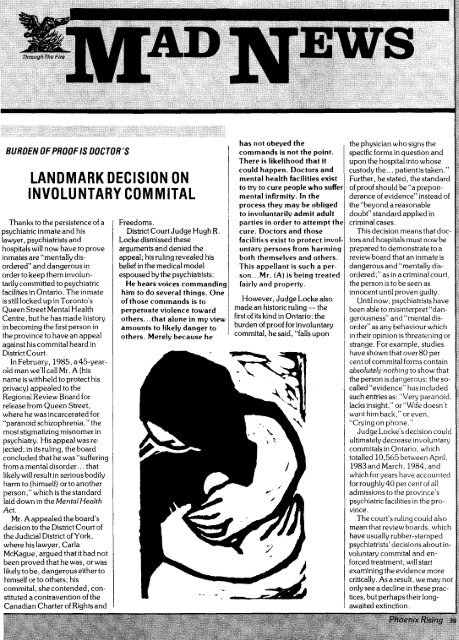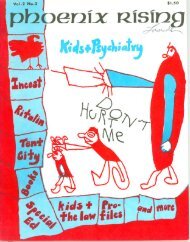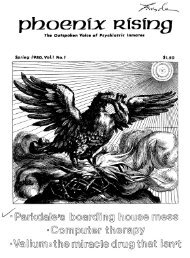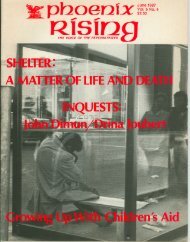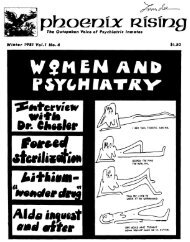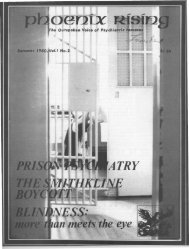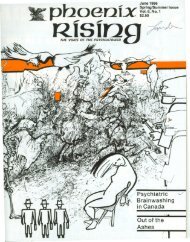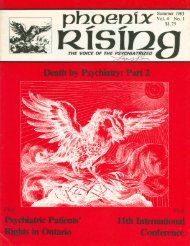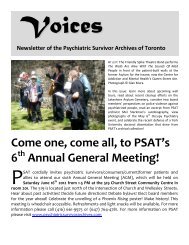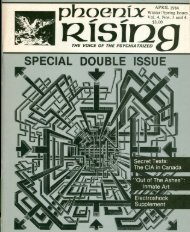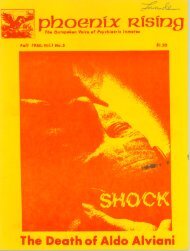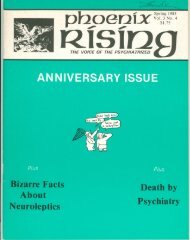Vol. 5, No. 4 - Psychiatric Survivor Archives of Toronto
Vol. 5, No. 4 - Psychiatric Survivor Archives of Toronto
Vol. 5, No. 4 - Psychiatric Survivor Archives of Toronto
You also want an ePaper? Increase the reach of your titles
YUMPU automatically turns print PDFs into web optimized ePapers that Google loves.
BURDEN OF PROOF IS DOCTOR'S<br />
LANDMARK DECISION ON<br />
INVOLUNTARY<br />
Thanks to the persistence <strong>of</strong> a<br />
psychiatric inmate and his<br />
lawyer, psychiatrists and<br />
hospitals will now have to prove<br />
inmates are "mentally disordered"<br />
and dangerous in<br />
order to keep them involuntarily<br />
committed to psychiatric<br />
facilities in Ontario. The inmate<br />
is still locked up in <strong>Toronto</strong>'s<br />
Queen Street Mental Health<br />
Centre, but he has made history<br />
in becoming the first person in<br />
the province to have an appeal<br />
against his commital heard in<br />
District Court.<br />
In February, 1985, a 45-yearold<br />
man we'll call Mr. A (his<br />
name is withheld to protect his<br />
privacy) appealed to the<br />
Regional Review Board for<br />
release from Queen Street,<br />
where he was incarcerated for<br />
"paranoid schizophrenia," the<br />
most stigmatizing misnomer in<br />
psychiatry. His appeal was rejected;<br />
in its ruling, the board<br />
concluded that he was "suffering<br />
from a mental disorder ... that<br />
likely will result in serious bodily<br />
harm to (himself) or to another<br />
person," which is the standard<br />
laid down in the Mental Health<br />
Act.<br />
Mr. A appealed the board's<br />
decision to the District Court <strong>of</strong><br />
the Judicial District <strong>of</strong> York,<br />
where his lawyer, Carla<br />
McKague, argued that it had not<br />
been proved that he was, or was<br />
likely to be, dangerous either to<br />
himself or to others; his<br />
commital, she contended, constituted<br />
a contravention <strong>of</strong> the<br />
Canadian Charter <strong>of</strong> Rights and<br />
COMMITAL<br />
Freedoms.<br />
District Court Judge Hugh R.<br />
Locke dismissed these<br />
arguments and denied the<br />
appeal; his ruling revealed his<br />
belief in the medical model<br />
espoused by the psychiatrists:<br />
He hears voices commanding<br />
him to do several things. One<br />
<strong>of</strong> those commands is to<br />
perpetuate violence toward<br />
others ... that alone in my view<br />
amounts to likely danger to<br />
others. Merely because he<br />
has not obeyed the the physician who signs the<br />
commands is not the point. specificforms in question and<br />
There is likelihood that It upon the hospital into whose<br />
could happen. Doctors and custody the ... patient is taken."<br />
mental health facilities exist Further, he stated, the standard<br />
to try to cure people who suffer' <strong>of</strong> pro<strong>of</strong> should be "a preponmental<br />
infirmity. In the derance <strong>of</strong> evidence" instead <strong>of</strong><br />
process they may be obliged the "beyond a reasonable<br />
to involuntarily admit adult doubt" standard applied in<br />
parties in order to attempt the criminal cases.<br />
cure. Doctors and those This decision means that docfacilitks<br />
exist to protect invol- tors and hospitals must now be<br />
untary persons from harming prepared to demonstrate to a<br />
both themselves and others. review board that an inmate is<br />
This appellant is such a per- dangerous and "mentally disson<br />
... Mr. (A) is being treated ordered;" as in a criminal court,<br />
fairly and properly.<br />
the person is to be seen as<br />
innocent until proven guilty.<br />
However, Judge Locke also Until now, psychiatrists have<br />
made an historic ruling - the been able to misinterpret "danfirst<br />
<strong>of</strong> its kind in Ontario: the gerousness" and "mental disburden<br />
<strong>of</strong> pro<strong>of</strong> for involuntary order" as any behaviour which<br />
commital, he said, "falls upon in their opinion is threatening or<br />
strange. For example, studies<br />
have shown that over 80 per<br />
cent <strong>of</strong> commital forms contain<br />
absolutely nothing to show that<br />
the person is dangerous; the socalled<br />
"evidence" has included<br />
such entries as: "Very paranoid,<br />
lacks insight," or "Wife doesn't<br />
want him back," or even,<br />
"Crying on phone."<br />
Judge Locke's decision could<br />
ultimately decrease involuntary<br />
commitals in Ontario, which<br />
totalled 10,565 between April,<br />
1983andMarch, 1984, and<br />
which for years have accounted<br />
for roughly 40 per cent <strong>of</strong> all<br />
admissions to the province's<br />
psychiatric facilities in the province.<br />
The court's ruling could also<br />
mean that review boards, which<br />
have usually rubber-stamped<br />
psychiatrists' decisions about involuntary<br />
commital and enforced<br />
treatment, will start<br />
examining the evidence more<br />
critically. As a result, we may not<br />
only see a decline in these practices,<br />
but perhaps their longawaited<br />
extinction.


